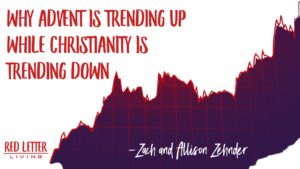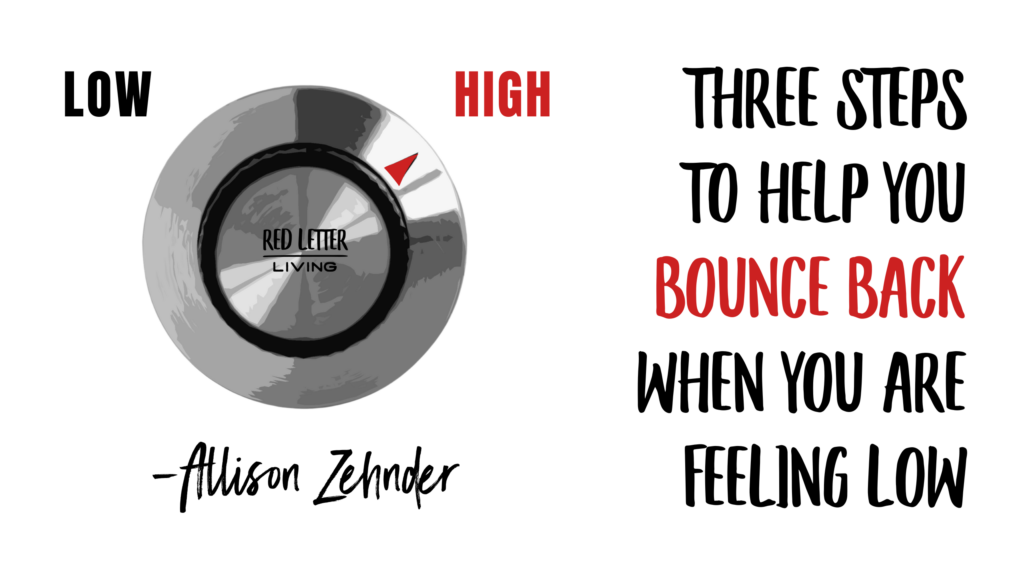

Zach and Allison sat down together and talked about a rough time Allison had last summer after writing their latest 40-day challenge books. They both learned some valuable lessons that may help others during a tough season.
Allison: After we put the finishing touches on Serving Challenge and Serving Challenge Kids in the spring of 2023, I hit a low. I could barely make dinner and keep up with household chores, let alone try to write or work on anything. My brain felt like mush, and I struggled to enjoy everyday activities.
Zach: Normally, it’s a great time for us with that load off of our shoulders.
Allison: I was totally expecting to feel great. Summer was coming. We both had tons of encouragement about finishing, but I was emotionally and physically struggling. So I just tried to busy my way out of it. I started writing a fiction novel. We had a jam-packed summer of travel on the books. But that summer was one of the hardest I’ve had in a while. Even though we were in all these happy places as a family, I was feeling depressed and lost.
Zach: I didn’t know what happened to my wife. No offense, I love you, but you were not yourself.
Allison: Honestly, I didn’t know what was going on. It felt like it came out of nowhere. What I found out later was that I was most likely experiencing PPD. (Not to be confused with postpartum depression, which I also had after my first son was born.) I had a bad case of post-publication depression. Do you think you have ever had PPD after finishing a big writing project?
Zach: I can get lows after finishing any big challenge, but it’s different from yours. I tend to get into a rut creatively. I have a hard time keeping habits without a deadline, a big event coming up, or a lot of ramp-up. It’s like I need all this pressure on me.
Allison: Yeah, I feel like you perform under pressure better than I do. Like when you trained and trained for the half marathon last year, but once it was done, you stopped running altogether.
Zach: Yeah, I can do that with working out or investing in a project. With Red Letter, books are never done for me, really. I keep speaking on my projects, which is my favorite thing to do. You enjoy the writing process more than I do. When it’s over, you no longer have much creative outlet with the project.
Allison: Yeah, I really don’t. Maybe that’s what triggered this PPD.
Writer Ann Janzer describes post-publication depression this way:
It’s a combination of two emotions:
Marathon runners struggle with similar symptoms. In HBO’s 2020 documentary The Weight of Gold, professional athletes describe feeling similar to what I was going through after a race.
In his article for Triathlete, Dr. Jim Taylor defends the low feelings after a big high as normal and necessary.
Such “post-big-race” down periods are normal and, despite triathletes’ best efforts, usually unavoidable. The fact is, triathletes shouldn’t try to avoid these feelings. PRD [post-race depression] actually plays an essential role in your recovery from the intensity of training and racing. Yet PRD is a source of uncertainty, concern, and just plain discomfort for triathletes.
Some athletes said they felt lost. Others experienced a lack of motivation to run and craved something to look forward to. Many felt down, anti-social, sad, or disappointed even when they reached their goals. Even the greatest Olympian of all-time, Michael Phelps, suffered an identity crisis when he stopped swimming competitively:
“If your whole life was about building up to one race, one performance, or one event, how does that sustain everything that comes afterward? . . . Eventually, for me at least, there was one question that hit me like a ton of bricks: Who was I outside of the swimming pool?”
Jesus’s temptation in the wilderness is a great model of Lent and a 40-day experience. Like Jesus, our lives have periods when we have to pull away from something to prepare for a new season or focus on God. However, nothing is actually written about Jesus’s forty-day experience itself.
The hardest part of Jesus’s time in the wilderness wasn’t the 40 days, it was what happened after. Jesus’s temptations didn’t occur during His fast. They occurred after His fast. Although our 40-day challenge books are transformative and a great catalyst for change, the biggest opposition you may encounter is not the forty days itself but afterward. How do you maintain and continue to grow after the challenge is over?
The accomplishment of Jesus’s 40 days resulted in a vicious attack by the devil. His experience teaches us that without God’s Word and a plan, you might end up right where you started.
Zach: Our 40-Day Challenge books have kickstarted a lot of people who want to do something. They use our material because many of them just didn’t know where to start.
Allison: For me personally, the books were an opportunity to look at Jesus’s words and His actions and really think about how that impacts my everyday life.
Zach: Remember that one reader who said they never thought about actually measuring spirituality? It was pretty cool that we could be a part of showing them it’s possible.
Allison: But then once the forty days are over, if people have a low after experiencing a great accomplishment, it’s perfectly reasonable for people to have this experience after one of our challenges, right? How do we help people bounce back after accomplishing a challenge?
Zach: You know my answer. It’s always “Look to Jesus!” These three steps work for any challenge: whether it’s a marathon or 5K race, or maybe a move to a new city, a new job, or doing a challenge in your church. They are rest, rejoice, and recommit.
Under each of the three steps below, we list the verses describing what Jesus did after His temptation in Matthew 4. Nothing in Scripture is by chance, so Jesus’s steps were exactly what He was supposed to do.
Then the devil left him; behold, angels came and were ministering to him. Matthew 4:11
Jesus went and lived by the sea after his temptation. It may not be immediate since we do not know the timeline, but we do know that there was a period of living in Capernaum after his temptation. Could this have been a time of rejoicing for him? His last words to Satan were to worship the Lord your God alone.
13 And leaving Nazareth, he went and lived in Capernaum by the sea. Matthew 4:13
Jesus re-committed to what his purpose on earth was.
From that time Jesus began to preach, saying, “Repent, for the kingdom of heaven is at hand. While walking by the Sea of Galilee, he saw two brothers, Simon (who is called Peter) and Andrew, his brother, casting a net into the sea, for they were fishermen. And he said to them, “Follow me, and I will make you fishers of men.” Matthew 4:17-19
Conclusion
Accomplishing a great task, achieving a goal, or finishing a challenge is no small task! But no matter what challenge you complete, take time to rest, rejoice, and recommit to God’s next challenge for you!
